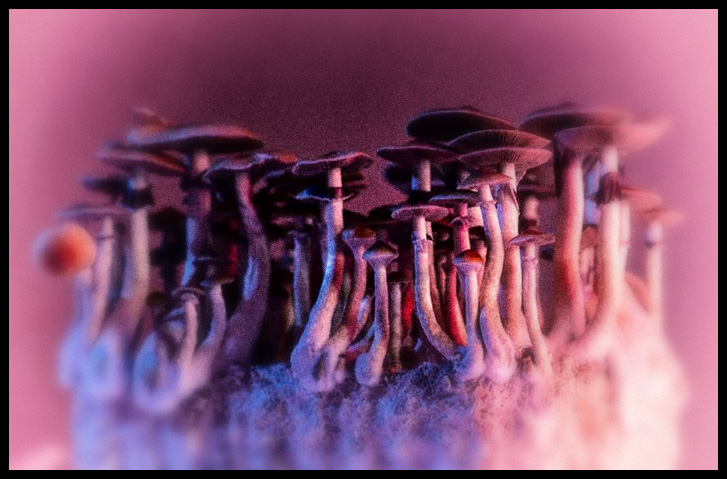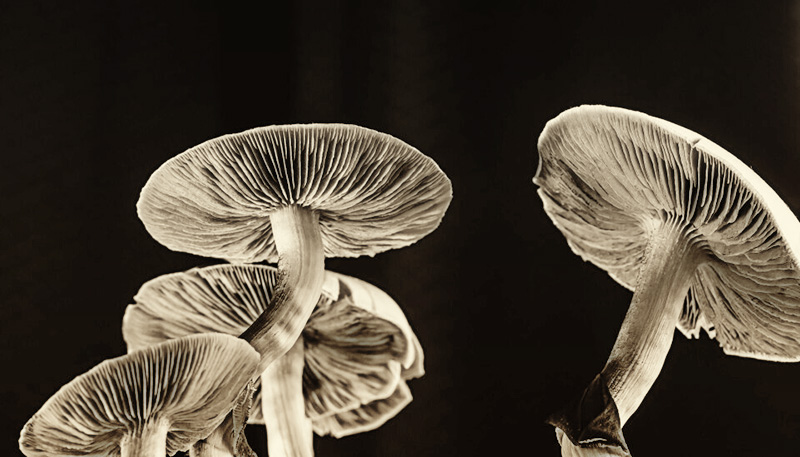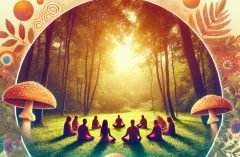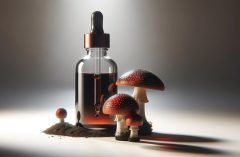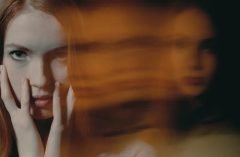Table of Contents [show]
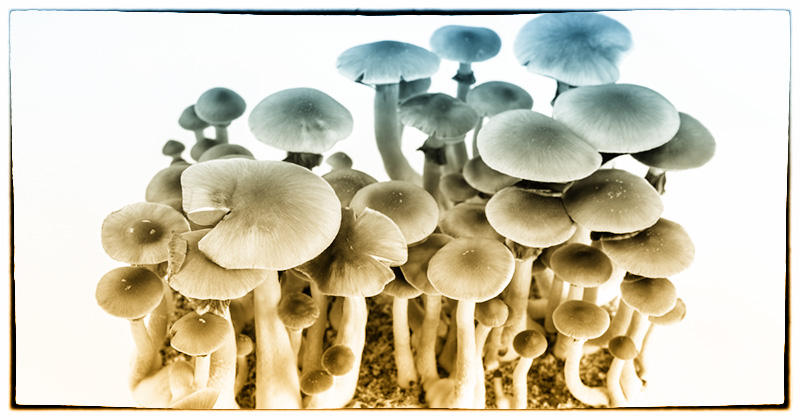
[ez-toc]Psychedelic mushrooms, also known as magic mushrooms or psilocybin mushrooms, have captivated human fascination for centuries.
These remarkable fungi contain a naturally occurring compound called psilocybin, which has gained significant attention for its potential therapeutic benefits.
While research on the medical applications of psychedelic mushrooms is still in its infancy, early studies and anecdotal evidence suggest promising outcomes, including this author’s own experience in 1970, and 2023.
This article explores the positive benefits of psychedelic mushrooms for medical purposes, covering topics such as identification, usage, preparation, dosage, and the psychedelic “trip” experience. I have sited my sources for much of this article, and of course included my own experiences as well.
Identification of Psychedelic Mushrooms
Identifying psychedelic mushrooms in the wild can be challenging and potentially dangerous, I don’t recommend it unless you have a certain expertise.
Therefore, it is essential to exercise caution and rely on expert guidance. (Trust me on this) Various species of psilocybin-containing mushrooms exist, each with distinct characteristics.
Field guides and resources created by mycologists and experienced foragers can aid in accurate identification. It is crucial to understand that misidentifying mushrooms can lead to adverse effects or even fatal consequences.
When it comes to consuming psychedelic mushrooms, it is recommended to obtain them from reliable sources such as licensed producers or certified professionals.
Usage and Preparation of Psychedelic Mushrooms
Once obtained from a trusted source, psychedelic mushrooms can be consumed orally. They can be eaten fresh (yuck!), dried, or incorporated into various culinary preparations. I like a cup of mushroom tea sweetened with honey.
However, proper preparation is key to ensuring a safe and effective experience. Drying the mushrooms reduces their weight and increases their potency, making dosage calculations more manageable.
Many individuals prefer to consume psychedelic mushrooms in the form of teas or capsules (only prepared by professionals, don’t try to capsulate them yourself) to mask their taste and facilitate ingestion.
It is important to note that the preparation method should not compromise the integrity of the psilocybin compound.
Dosage and Administration
Determining the appropriate dosage of psychedelic mushrooms is critical to achieve the desired therapeutic benefits while minimizing potential risks.
The potency of mushrooms can vary significantly, depending on the species, growth conditions, and preparation methods. Thus, it is recommended to start with a low dosage and gradually increase it in subsequent sessions to assess personal sensitivity and tolerance.
The dosing regimen for therapeutic purposes varies and should always be guided by a healthcare professional or experienced facilitator. In clinical research settings, psilocybin-assisted therapy sessions typically involve carefully controlled doses, ranging from 10 to 25 milligrams of psilocybin.
These sessions are supervised by trained professionals (trip sitters?) to ensure a safe and supportive environment.
Positive Benefits for Medical Purposes
Research into the therapeutic applications of psychedelic mushrooms has begun to shed light on their potential benefits:
- Mental Health Disorders: Studies suggest that psychedelic mushrooms may hold promise in treating mental health disorders such as depression, anxiety, and post-traumatic stress disorder (PTSD). Psilocybin has been shown to induce a state of neuroplasticity, allowing individuals to explore and reframe their thoughts and emotions, leading to lasting positive effects. I’ll discuss my 1970 experiences closer to the end of this article.
- Addiction Treatment: Psychedelic mushrooms have shown potential in addressing substance use disorders, particularly in the context of addiction treatment. Psilocybin-assisted therapy sessions have been found to enhance motivation, reduce cravings, and provide individuals with a new perspective on their addictive behaviors.
- End-of-Life Distress: Patients facing terminal illnesses often experience significant psychological distress. Psychedelic mushrooms, when used in a controlled therapeutic setting, have shown promising results in reducing end-of-life anxiety, depression, and fear of death. These experiences can lead to a sense of acceptance, improved well-being, and a more peaceful transition.
The Psychedelic “Trip” Experience
A psychedelic “trip” refers to the altered state of consciousness induced by psilocybin. It is a highly subjective experience, varying among individuals. The effects typically manifest within 20 to 60 minutes after ingestion and may last for several hours. Mine own experiences when I was young seemed to have lasted 12-18 hours, but these were uncontrolled ‘mushroom trips’ typical of the 60’s and early 70’s.
Common experiences during a psychedelic trip include sensory alterations, changes in perception, enhanced introspection, emotional breakthroughs, and spiritual or mystical experiences. And I am not exaggerating here.
During a trip, individuals may encounter challenging or difficult emotions, often referred to as a “bad trip.” It is crucial to emphasize the importance of a supportive and safe environment during these experiences.
Having an experienced trip sitter or a professional facilitator present can provide guidance, reassurance, and assistance if needed.
My Mushroom Experiences 1970
Without getting too much into the details or setting of my own psychedelic experiences 50+ years ago, suffice it to say that they were truly enlightening, and certainly disturbing to my parents.
A good mushroom “trip” will give you very pleasant feelings, if you don’t panic when you reach the peak of your trip. Although you won’t really have all the answers to the universe, you just might think you do. At least I did.
I experienced severe childhood trauma from the age of 5 to the age of 11. Night terrors lasted until the age of 19, but quickly lessened after my first mushroom trip. My mind, my consciousness, led me to consider the evil traumas as nothing more than a temporary blip on an infinite plane of existence.
Before using psilocybin, I was stuck in the past, always reliving the details in my dreams, and bringing that anxiety out into the world. I constantly self-medicated with anything I could get. LSD was my preferred drug for a couple of years, before being introduced to psilocybin.
I remember thinking afterwards that I had talked my trip sitters ear off during my trip, only to be told that I barely spoke. All the discussions I had were internal discussions about the BIG questions. Questions that mattered much more than past trauma.
When you’re 18 years old in the days of The Beatles as a current band, it’s not as though as you think to want to talk, or feel, the big issues; what is life, why are we here, what am I doing with my life, and do I really want to stick with my arbitrary life plans?
By the time I stopped my weekly psilocybin intake I had decided to dump my plans to study ‘business’ in college and instead studied ‘philosophy, logic, and literature’. I had zero interest in a 9-5 job. And truth be told, in 50+ years I never did. I discovered one of the easiest things to do in life was make money, because I no longer needed to, at least not in the same way.
In today’s modern society everyone needs to earn to have a shelter, food, clothes, and anything else you desired. But before psilocybin I “wanted” to make money in business. Big difference between wanting to make money and earning money as needed.
Psilocybin mushrooms opened me up to life outside of the walls of society. Civilization was something we built to keep us safe, it wasn’t a real reflection of reality. I pierced that veil, and existed inside of society, functioned inside of society, on my terms. I’m 70 now, and my life took a turn at 18 and I never looked back.
These days, psilocybin mushrooms are enjoyed every 3 or 4 months, and used to look back, see my life’s trail, and revisit old friends in false realties I create in my mind. Psilocybin removed any fear of death I may have had as a teenager, and that non-fear lasted me all my life.
Conclusion – Are Psychedelic Mushrooms Worth the Trip?
While research on the medical benefits of psychedelic mushrooms is ongoing, early evidence suggests their potential in addressing mental health disorders, addiction treatment, and end-of-life distress. However, it is crucial to approach the use of psychedelic mushrooms with caution, seeking guidance from healthcare professionals or experienced facilitators. Do not do what I did, it’s a very different world.
Psychedelic mushrooms can alter your life plans, open your mind up to new ideas, new realities, and force you to see the universe in a brand new way. If you’re not ready for that maybe staying with cannabis edibles is the best thing to do.
The psychedelic experience can be profound, leading to positive outcomes, but it requires responsible usage and a respectful attitude towards the mushrooms’ power. As the field progresses, continued research and exploration will be key to unlocking the full potential of psychedelic mushrooms for medical purposes. We live in interesting times.
-
John Manzione
Sources:
- Griffiths, R. R., et al. (2016). Psilocybin produces substantial and sustained decreases in depression and anxiety in patients with life-threatening cancer: A randomized double-blind trial. Journal of Psychopharmacology, 30(12), 1181-1197.
- Johnson, M. W., et al. (2019). Effects of Psilocybin-Assisted Therapy on Major Depressive Disorder: A Randomized Clinical Trial. JAMA Psychiatry, 76(4), 1-10.
- Garcia-Romeu, A., et al. (2015). Psilocybin-occasioned mystical experiences in the treatment of tobacco addiction. Current Drug Abuse Reviews, 7(3), 157-164.
- Johnson, M. W., et al. (2014). Pilot study of the 5-HT2AR agonist psilocybin in the treatment of tobacco addiction. Journal of Psychopharmacology, 28(11), 983-992.


